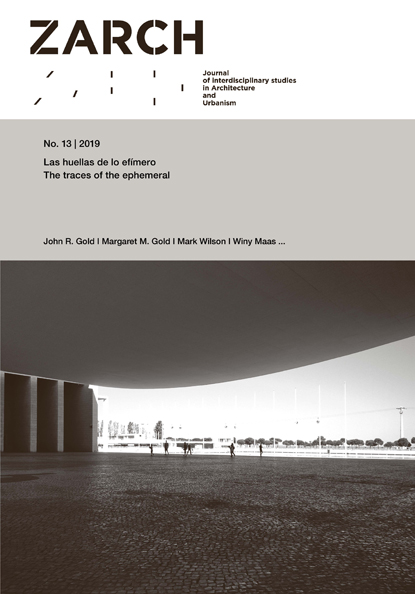Tales of the Olympic city: memory, narrative and the built environment
DOI:
https://doi.org/10.26754/ojs_zarch/zarch.2019133954Keywords:
Olympics, Memory, London 2012, Narrative, ContestationAbstract
The Olympics have a greater, more profound and more pervasive impact on the urban fabric of their host cities than any other sporting or cultural event. This paper is concerned with issues of memory and remembering in Olympic host cities. After a contextual introduction, it employs a case study of the Queen Elizabeth Olympic Park (QEOP), the main event space for the London 2012 Summer Games, to supply insight into how to read the urban traces of Olympic memory. Three key themes are identified when interpreting the memories associated with the Park and its built structures, namely: treatment of the area’s displaced past, memorializing the Games, and with memory legacy. The ensuing discussion section then adopts a historiographic slant, stressing the importance of narrative and offering wider conclusions about Olympic memory and the city.
Downloads
References
ABERCROMBIE, Patrick. 1945. Greater London Plan 1944. London: HMSO.
BERNSTOCK, Penny. 2014. Olympic Housing: A Critical Review of London 2012's Legacy. Farnham: Ashgate.
BUTTERFIELD, Herbert. 1931. The Whig Interpretation of History. London: George Bell.
COHEN, Phil and WATT, Paul (eds). 2017. London 2012 and the Post-Olympics: a hollow legacy? Basingstoke: Palgrave-Macmillan.
ESSEX, Stephen and CHALKLEY, Brian. 1998. ‘Olympic Games: catalyst of urban change’. Leisure Studies, 17, 187-206.
GIRGINOV, Vassil. 2018. Rethinking Olympic Legacy. Abingdon: Routledge.
GOLD, John R. and GOLD, Margaret M. 2017. Olympic futures and urban imaginings: from Albertopolis to Olympicopolis. In John Hannigan and Greg Richards (eds). The SAGE Handbook of New Urban Studies, London: Sage, 514-34.
GOLD, John R. and GOLD, Margaret M. 2017. The enduring enterprise: the Summer Olympics, 1896-2012. In John R. Gold and Margaret M. Gold (eds). Olympic Cities: city agendas, planning and the world’s games, 1896-2012. London: Routledge: 21-63.
GOLD, John R. and GOLD, Margaret M. 2018. Urban Segments and Event Spaces: World’s Fairs and Olympic Sites. In Carola Hein, ed. The Routledge Handbook of Planning History, Abingdon: Routledge, 348-63.
GRIX, Jonathan. (ed). 2017. Leveraging Mega-event Legacies, Abingdon: Routledge.
HOBSBAWM, Eric. 1983 Introduction: inverting tradition. In Eric Hobsbawm and Terence Ranger, T., eds.1983. The Invention of Tradition. Cambridge: Cambridge University Press, 1-14.
LEOPKEY, Becca and PARENT, Milena M. 2017. The governance of Olympic legacy: process, actors and mechanisms. Leisure Studies, 36, 438-451.
MACALOON, John J. 2016. Agenda 2020 and the Olympic movement. Sport in Society, 19, 767-785.
OLYMPIC PARK LEGACY COMPANY. 2010. A Walk around Queen Elizabeth Olympic Park. London: Olympic Park Legacy Company.
O'NEILL, Patrick. 1996. Fictions of Discourse: reading narrative theory, Toronto: University of Toronto Press.
POWELL, Hilary and MARRERO, Isaac (eds). 2012. The Art of Dissent: Adventures in London's Olympic State. London: Marshgate Press.
REAVEY, Paula. 2017. Scenic memory: experience through time–space. Memory Studies, 10, 107–111.
ROBBINS, Glyn. 2015. From Upton Park to Olympic Park: What does West Ham’s move tell us about sport and regeneration? Local Economy, 30, 975-982.
SINCLAIR, Iain. 2011. Ghost Milk: calling time on the Grand Project. London: Hamish Hamilton.
VIEHOFF, V. and POYNTER, G., 2016. This is East 20? Urban Fabrication and the Re-making of the Olympic Park: Some Research Issues. In Valerie Viehoff and Gavin Poynter (eds) Mega-event Cities: Urban Legacies of Global Sports Events. Abingdon: Routledge, pp. 105-118.


